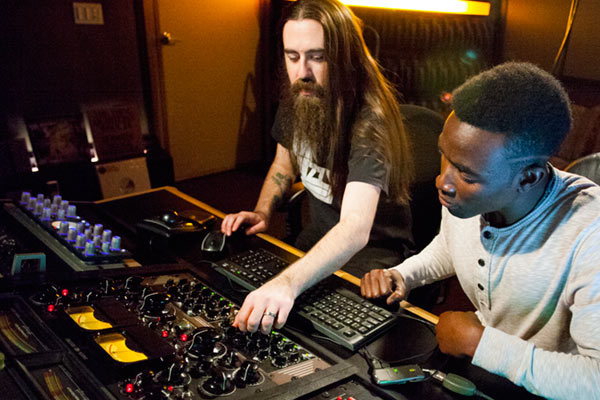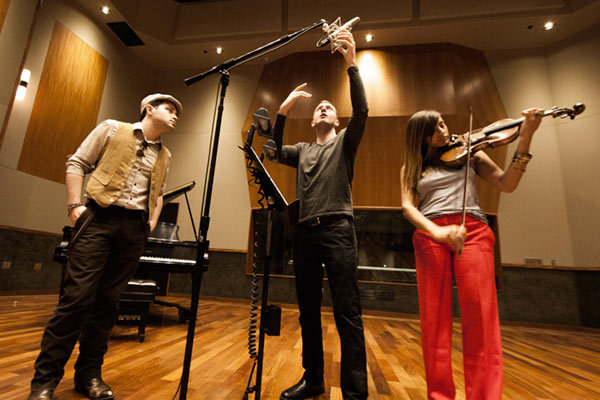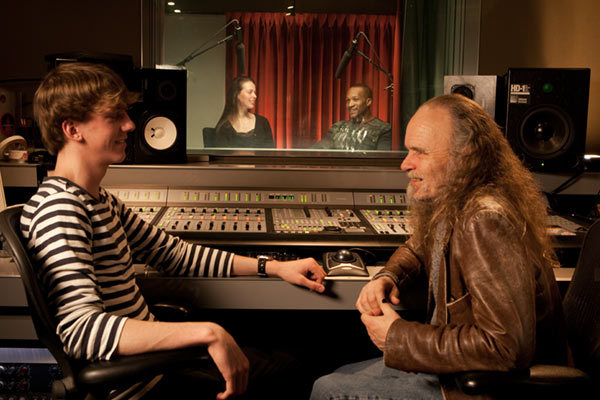On-the-Job Training
WHY DO WE TRAIN YOU **ON-THE-JOB?
With the Recording Radio Film Connection & CASA Schools, you’ll receive a solid foundation of career training in the field of your choice—but the real difference between RRFC and other schools is not what we teach you, but where and how we teach you. Every RRFC student spends a large percentage of their educational program in a hands-on practical externship in a Real World environment, not in a classroom.
Textbooks and Labs Aren't Enough

Why do we put our students in real studios, companies and professional kitchens for their training, instead of placing them in classrooms and labs before they're "ready" for the real world? The answer is simple: we believe that you can't really learn to produce a hit single in a classroom. Or learn to host a radio show. Or light a film set, or run the camera. Or pitch a script. Or prepare twenty different meals at once. Or mix a session. Or…
You get the idea. You could spend 2-4 years (and a lot of money) learning ideas, principles and maybe a few techniques out of a textbook in a class, but the way you'll learn how things work in the real world is to get into the real world and learn inside of the places where those skills are used day in, day out. Until you do, your education is incomplete.
What do we mean when we say your education is incomplete? Here are a few examples:
- You can learn to mix tracks in an audio school classroom, but you can't learn how to deal diplomatically with a paying client who is pressuring you to get it right the first time.
- You can learn to run a film camera or light a set in film school, but you can't learn to do it in a challenging location when you're four hours behind schedule and the director is yelling at you through the headset to get the shot.
- You can learn how to run a board and develop a natural radio voice in broadcasting school, but you can't learn how to keep your cool on the mic when everything is going wrong in the studio.
- You can learn how to perform a great sauce reduction in a culinary school kitchen, but you can't learn to do it on a busy Friday night with a restaurant full of customers and a dozen other meals in the queue.
Here's the thing: most industry professionals who graduate from classroom-based schools will tell you their real education happened after they got out of school! (Many of them also openly wish they hadn't spent so much money on their schooling.) So why spend those 2-4 years in a classroom when you could be learning those things on-the-job for a lot less money—and learning to do things the way the pros do them by working alongside them?
Work Experience

Another thing you can't get in a classroom is work experience—and experience is the main thing potential employers are looking for. In the industries RRFC serves, most employers simply don't care where (or if) you went to school, or for how long. They care that you have on-the-job experience. Grammy winning producer and engineer Ryan Hewitt (blink-182, Red Hot Chili Peppers, The Lumineers) tells us being freshly graduated from a college or conventional audio school doesn’t impress him the way some might assume. “I want people with actual experience, not fanciful degrees which basically tell me you have zero understanding of how the industry works.â€
As an extern, you’re getting the experience that an intern would normally get, plus you're getting one-on-one instruction from a mentor who is taking extra time to make sure you know how things work. We believe solid work experience looks a lot better on a resume than proof you sat in a classroom.
Connections

Finally, one of the most important things about the industries we serve is that they all live and breathe by connections. You could be a very talented producer but if no one in the music industry knows you, what are the chances of them hiring you? The same goes for film industry jobs, restaurant jobs, and jobs in radio. Connections are key.
One of the main benefits of on-the-job training is that you're taking your classes in the workplace where the pros are working every day. Each day you go to class is another opportunity to form valuable connections with these people, and hopefully impress them with your passion, your work ethic and your growing set of skills. Many of our students have literally worked themselves into a job just by making the most of the opportunity, networking and making connections while they were in the work place. You can't do this in a classroom, but you can do it on-the-job. It's that simple.
SO…why does RRFC train you on-the-job?
Considering all the benefits involved…why wouldn't we?








